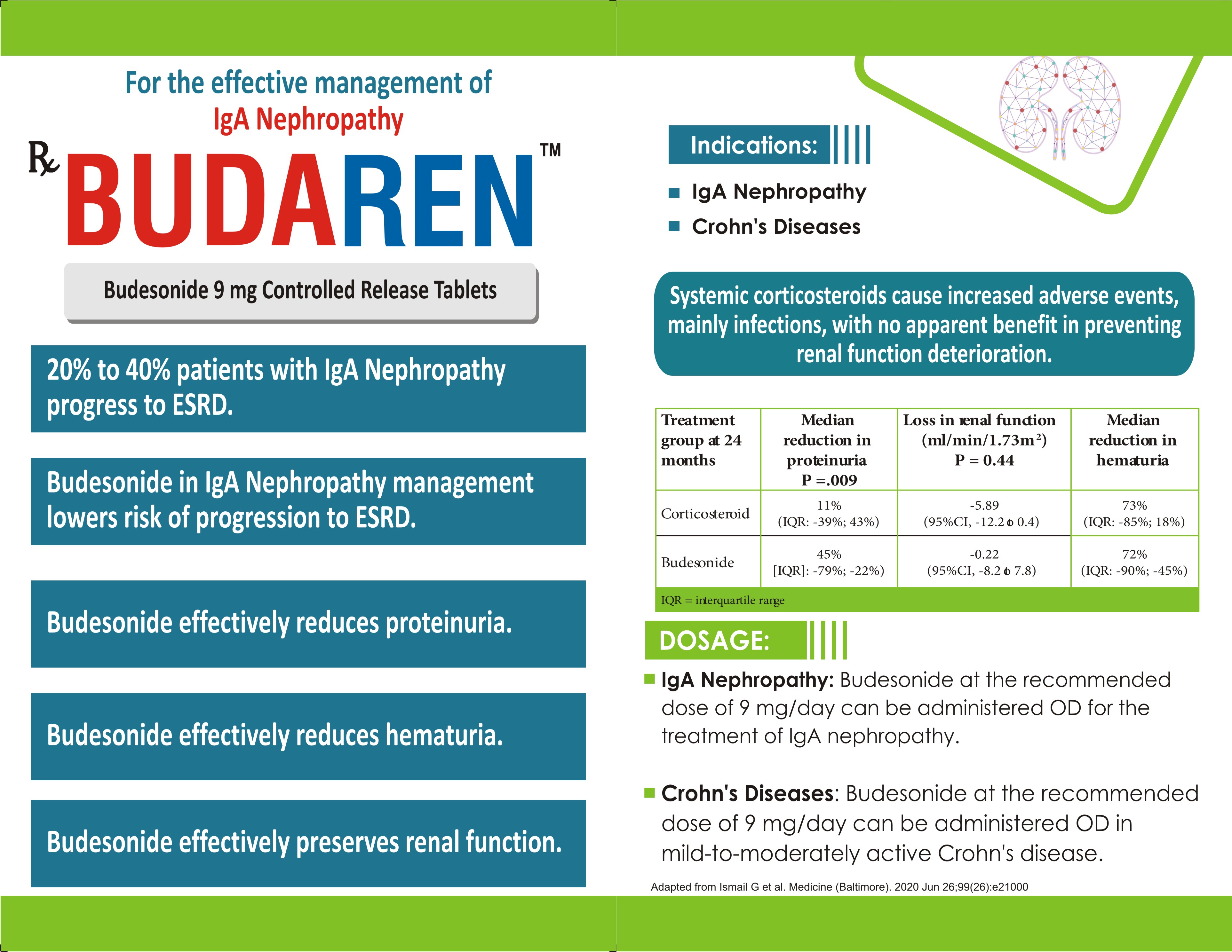Budaren
Budaren
Budaren-9 is Budesonide 9 mg tablets which are used primarily for the treatment of inflammatory bowel diseases like Crohn's disease and have also been studied for use in conditions such as IgA nephropathy. Here's detailed information on this medication in the context of these diseases:
Composition:
• Budesonide: 9 mg
Mechanism of Action:
Budesonide is a corticosteroid with potent anti-inflammatory properties. It works by decreasing inflammation and immune responses by inhibiting multiple inflammatory cytokines and mediators, thereby reducing the activity of the immune system that causes inflammation.

Indications:
1. Crohn's Disease:
•Indication: Budesonide is indicated for the treatment of mild to moderate Crohn's disease involving the ileum and/or ascending colon.
•Mechanism: It provides local anti-inflammatory effects in the gastrointestinal tract, helping to reduce symptoms such as abdominal pain, diarrhea, and weight loss.
•Dosage: Typically, 9 mg once daily in the morning for up to 8 weeks. The dosage may be tapered based on the patient's response and physician's advice.
2. IgA Nephropathy:
•Indication: Budesonide has been investigated for use in IgA nephropathy, an autoimmune disease affecting the kidneys characterized by the deposition of IgA antibodies in the glomerulus.
•Mechanism: Budesonide helps by reducing the local immune response and inflammation within the gastrointestinal tract, which may indirectly affect the kidney's immune environment.
•Dosage: While specific dosing for IgA nephropathy can vary, clinical studies often use similar dosing to that used in gastrointestinal indications, adjusted based on the patient's response and the physician's discretion.
Side Effects:
•Common Side Effects: Headache, respiratory infection, nausea, back pain, indigestion, abdominal pain.
•Serious Side Effects: Increased risk of infection, adrenal suppression, hyperglycemia, hypertension, osteoporosis, and psychiatric effects such as mood swings or depression.
Precautions:
•Infection Risk: Increased risk of infections due to immunosuppressive effects. Patients should avoid exposure to infections and consult a doctor if signs of infection occur.
•Adrenal Suppression: Risk of adrenal suppression and possible withdrawal symptoms if stopped abruptly. Dosage should be tapered off gradually under medical supervision.
•Bone Health: Long-term use can lead to osteoporosis. Patients should be monitored for bone density and consider calcium and vitamin D supplementation.
•Liver Function: Patients with liver impairment should use budesonide cautiously as it may increase systemic exposure.
Contraindications:
•Hypersensitivity to budesonide or any of the ingredients in the formulation.
•Active untreated infections, especially systemic fungal infections.
Drug Interactions:
•CYP3A4 Inhibitors: Drugs like ketoconazole and erythromycin can increase the systemic concentration of budesonide.
•CYP3A4 Inducers: Drugs like rifampin and carbamazepine can decrease the effectiveness of budesonide.
•Other Corticosteroids: Concurrent use with other corticosteroids may increase the risk of side effects.
Monitoring:
•Regular monitoring of blood pressure, blood glucose levels, and signs of infection.
•Periodic assessment of bone density, especially with long-term use.
•Monitoring for any signs of adrenal insufficiency, especially when discontinuing the drug.
